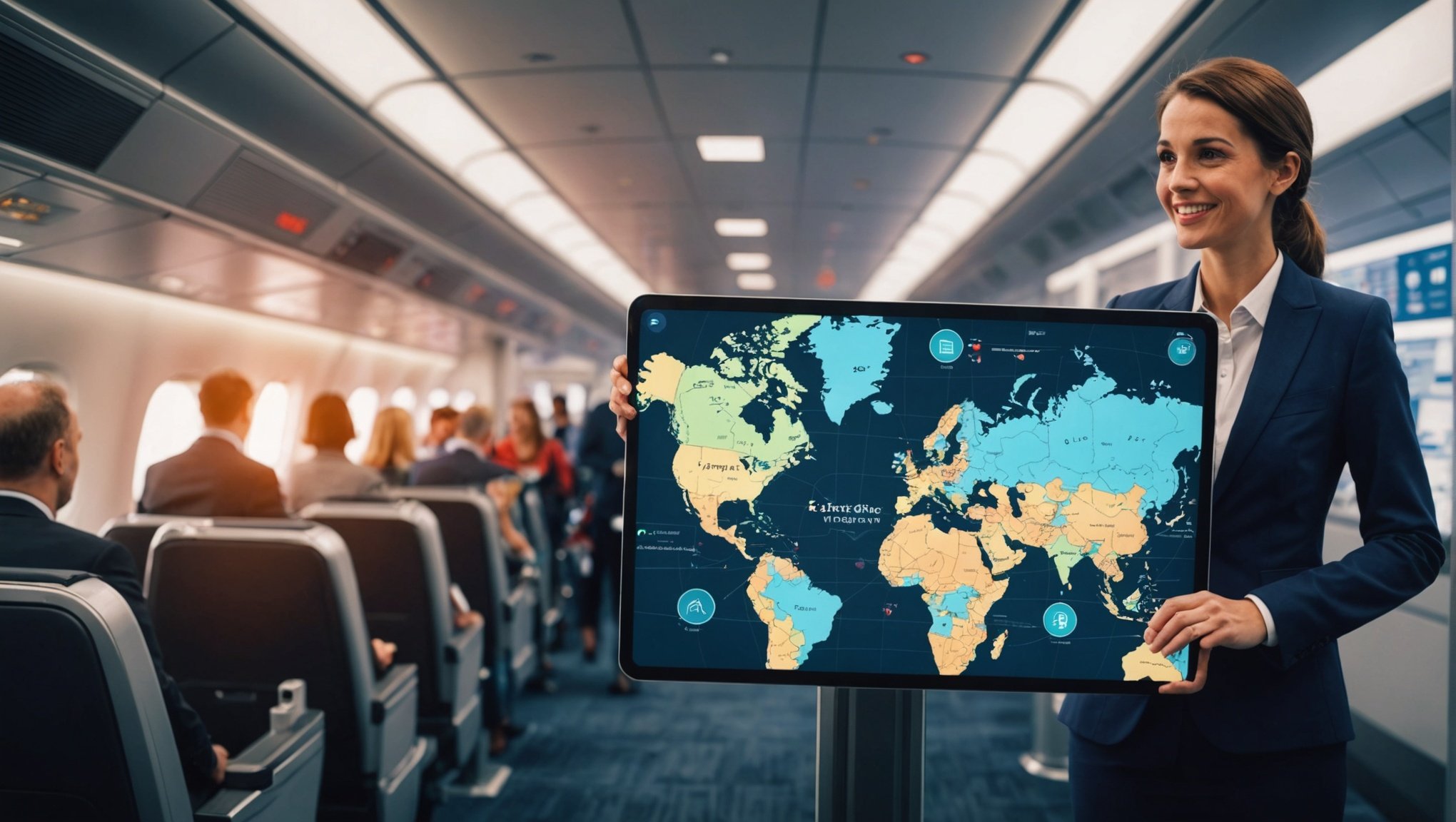The travel industry is evolving rapidly, largely due to AI's powerful capabilities. UK travel agencies can now anticipate trends and preferences, significantly enhancing customer satisfaction. By leveraging data analytics, agencies gain insights into traveler behavior, enabling tailored offerings and optimized experiences. This guide explores practical strategies for harnessing AI, ensuring your agency stays ahead of the competition while creating memorable journeys for clients. Discover how to transform your operations and connect with customers like never before.
Understanding AI's Role in the Travel Industry
The integration of AI in Travel has revolutionised the way the industry operates. From personalising customer experiences to optimising operational processes, AI applications are diverse and transformative. One significant impact is on travel agencies, where AI enhances operational efficiency by automating routine tasks such as booking management and customer service. This automation not only reduces human error but also allows staff to focus on more complex customer queries, thereby improving overall service quality.
Topic to read : Maximizing Your Digital Ad Spend: A Guide for Small Businesses in the UK
Travel Industry Trends indicate a growing reliance on AI-driven solutions. Chatbots, for instance, are increasingly used for customer interaction, providing instant responses and personalised recommendations. This trend towards automation is further supported by AI's ability to analyse vast amounts of data, offering insights into consumer preferences and emerging market trends.
Looking ahead, Travel Technology is set to evolve with advancements in AI. Future trends may include more sophisticated virtual reality experiences for destination previews and AI-powered predictive analytics for more accurate travel forecasts. As AI continues to develop, its role in enhancing travel experiences and operational efficiencies is expected to expand, providing both challenges and opportunities for industry stakeholders.
Have you seen this : Essential Steps for Crafting a Responsive Design for UK Government Websites
Analyzing Travel Trends through AI
In today's rapidly evolving travel industry, Predictive Analytics plays a pivotal role in understanding and forecasting Travel Patterns. By leveraging AI, travel agencies can efficiently analyse large datasets to extract valuable Market Insights. This capability allows agencies to anticipate customer needs and adapt their services accordingly.
One of the key benefits of AI in this context is its ability to identify emerging trends. For instance, UK travel agencies have successfully utilised AI to predict shifts in traveller preferences, such as the growing interest in sustainable tourism. By analysing historical data and current travel behaviours, these agencies can make informed decisions on marketing strategies and service offerings.
Various tools and technologies are employed to facilitate this trend analysis. Machine learning algorithms, for example, are adept at processing complex datasets, enabling agencies to uncover patterns that would be difficult to identify manually. Additionally, natural language processing (NLP) tools can analyse customer reviews and feedback to gauge sentiment and preferences.
Incorporating AI-driven Predictive Analytics not only enhances the ability to forecast Travel Patterns but also positions agencies to respond proactively to changes in consumer behaviour. This strategic advantage is crucial for maintaining competitiveness in an ever-changing market landscape.
Enhancing Customer Experience with AI
In the modern travel industry, AI Solutions are pivotal in transforming customer interactions and boosting Customer Satisfaction. By leveraging AI-driven Personalization, travel agencies can tailor services to individual preferences, ensuring a memorable and seamless experience.
AI-driven personalization involves analysing customer data to offer bespoke travel recommendations. This could include suggesting destinations based on past trips or curating itineraries that align with personal interests. Such tailored experiences are made possible through sophisticated algorithms that predict customer needs with remarkable accuracy.
Chatbots and virtual assistants are revolutionising customer service by providing immediate responses and assistance. These AI-powered tools can handle a wide range of queries, from booking modifications to travel advice, thereby enhancing the efficiency and satisfaction of customer interactions.
Moreover, AI plays a crucial role in measuring customer satisfaction metrics. By analysing feedback from various touchpoints, AI can identify trends and areas for improvement. This data-driven approach enables travel agencies to refine their services continuously, fostering a customer-centric environment.
Incorporating AI into travel services not only enhances Customer Satisfaction but also sets a new standard for Personalization in the industry, ensuring that every traveller feels valued and understood.
Implementing AI Tools in Travel Agencies
Adopting AI Implementation in travel agencies involves a strategic approach to integrate Travel Agency Tools into existing systems. The first step is to assess current operations to identify areas where AI can enhance efficiency. This could include automating booking processes or improving customer service with chatbots.
Selecting the right AI tools is crucial. Agencies should consider tools that align with their specific needs, such as predictive analytics for market trends or natural language processing for customer interaction. It's essential to evaluate the scalability and compatibility of these tools with existing technology.
Training staff is a pivotal aspect of successful Technology Adoption. Employees must be equipped with the skills to operate AI tools effectively. This can be achieved through comprehensive training programs and workshops that focus on practical applications. Continuous learning opportunities should be provided to keep staff updated with technological advancements.
Moreover, fostering a culture of innovation within the agency encourages staff to embrace AI. By understanding the benefits and capabilities of AI, employees can contribute to its effective implementation, ultimately enhancing service delivery and operational efficiency. Integrating AI into travel agencies not only streamlines processes but also positions them at the forefront of technological advancement in the industry.
Case Studies of Successful AI Adoption in UK Travel Agencies
Exploring Case Studies of AI implementation provides valuable insights into the Best Practices adopted by leading UK Travel Agencies. These agencies have successfully integrated AI to enhance their operations and customer service, setting benchmarks for others in the industry.
A notable example is a prominent UK travel agency that utilised AI to streamline its booking processes. By automating routine tasks, they reduced operational costs and improved efficiency. This case study highlights the importance of identifying specific areas where AI can add value, ensuring a targeted approach to technology adoption.
However, not all AI implementations are seamless. Some agencies faced challenges, such as inadequate staff training or selecting incompatible AI tools. These lessons learned underscore the need for comprehensive planning and employee engagement in the AI adoption process.
Best practices for successful AI integration include:
- Conducting thorough assessments of current operations to identify AI opportunities.
- Ensuring compatibility between new AI tools and existing systems.
- Investing in staff training to build confidence and expertise in AI technologies.
By embracing these practices, UK travel agencies can effectively leverage AI to enhance service delivery and maintain a competitive edge in the evolving travel landscape.
The Economic Impact of AI on Travel Agencies
The integration of AI solutions in travel agencies has significant economic impacts, primarily through cost efficiency and potential revenue growth. By automating routine tasks, agencies can achieve substantial cost savings. For example, AI-driven chatbots and booking systems reduce the need for extensive human resources, cutting down on labour expenses while maintaining high service levels.
Furthermore, AI opens doors to revenue growth by enhancing customer engagement and personalisation. With AI analysing customer data, agencies can tailor offerings to meet specific preferences, thereby increasing sales opportunities. This personalised approach not only attracts new customers but also fosters loyalty among existing ones, contributing to sustained revenue streams.
In terms of long-term economic benefits, AI equips travel agencies with tools to adapt to market changes swiftly. Predictive analytics, for instance, allow agencies to anticipate travel trends and adjust strategies accordingly. This foresight ensures that agencies remain competitive and can capitalise on emerging opportunities.
Overall, the strategic use of AI in travel agencies promises a future of increased cost efficiency and revenue growth, positioning these businesses to thrive in a dynamic industry landscape. Through continuous adaptation and innovation, the economic potential of AI can be fully realised.
Ethical Considerations in AI Usage
Implementing Ethical AI in the travel industry requires careful navigation of data privacy concerns and responsible deployment strategies. As AI becomes more integral to travel operations, protecting customer data is paramount. This involves ensuring that all data collection and processing adhere to stringent privacy regulations, such as the GDPR in Europe. Agencies must implement robust encryption and anonymisation techniques to safeguard personal information.
In customer interactions, ethical considerations extend to transparency and fairness. AI systems should be designed to provide clear communication about how data is used and offer customers control over their information. This transparency builds trust and encourages more meaningful interactions.
Responsible AI Practices involve deploying AI technologies that are not only efficient but also equitable. This means avoiding biases that can arise from skewed data sets, which may lead to unfair treatment of certain customer groups. Regular audits and updates of AI algorithms are essential to maintain fairness and accuracy.
To ensure ethical AI deployment, travel agencies can adopt strategies such as:
- Conducting ethical impact assessments.
- Training staff on ethical AI use.
- Engaging with stakeholders to align AI practices with societal values.
By prioritising these strategies, agencies can navigate the complexities of AI ethics effectively.
Future Innovations in AI for Travel
The future of the travel industry is poised for transformation through AI Innovations and Emerging Technologies. One promising development is the integration of AI-powered virtual assistants capable of providing real-time, personalised travel recommendations. These assistants will leverage Future Trends in machine learning to anticipate traveller needs even before they are expressed.
Another exciting prospect is the use of AI Innovations in creating immersive travel experiences. Virtual reality (VR) tours, enhanced by AI, will allow potential travellers to explore destinations virtually, offering a taste of the experience before committing to a trip. This technology will not only engage customers but also influence decision-making processes.
As these Emerging Technologies advance, the travel industry must prepare for significant changes. Agencies will need to invest in infrastructure that supports these innovations, ensuring seamless integration with existing systems. Training staff to adapt to new tools and processes will be crucial for maintaining competitiveness.
Predictions indicate that AI will play a pivotal role in streamlining operations and enhancing customer experiences. By embracing these Future Trends, travel agencies can position themselves at the forefront of the industry, ready to meet the evolving demands of tech-savvy travellers.
Building a Customer-Centric AI Strategy
Creating a Customer-Centric AI Strategy is crucial for travel agencies aiming for growth. This involves developing AI strategies that are not only aligned with technological advancements but also focused on meeting customer needs. By prioritising customer satisfaction, agencies can enhance their service offerings and maintain a competitive edge.
To effectively align AI initiatives with overall business goals, agencies must first identify key customer touchpoints where AI can add value. This could include personalisation of travel itineraries or improving customer service through AI-driven chatbots. By focusing on these areas, agencies can ensure that their AI strategies are directly contributing to enhanced customer experiences.
Measuring the success of customer-centric AI applications is essential for continuous improvement. Agencies should implement metrics that evaluate both customer satisfaction and the efficiency of AI tools. These metrics can include customer feedback, service response times, and the accuracy of AI recommendations. By regularly assessing these factors, agencies can refine their AI applications to better serve their clientele.
Incorporating a Customer-Centric AI Strategy not only drives travel agency growth but also fosters a more personalised and engaging experience for travellers, ultimately leading to increased customer loyalty and business success.
Resources and Tools for AI in Travel
Incorporating AI Resources into the travel industry requires access to the right Travel Technology Tools. For agencies looking to integrate AI, several platforms stand out. Tools like Amadeus and Sabre offer comprehensive solutions for booking management and customer service automation. These platforms are designed to streamline operations, enhance customer interactions, and provide valuable insights through data analytics.
Educational Learning Materials are essential for travel agencies aiming to leverage AI effectively. Online courses, such as those offered by Coursera and edX, provide in-depth training on AI applications specific to the travel sector. These courses cover topics like machine learning, data analysis, and natural language processing, equipping agency staff with the skills needed to implement AI solutions confidently.
Networking opportunities and communities play a crucial role in the continuous development of AI professionals in travel. Conferences such as the AI in Travel Summit offer platforms for industry experts to share insights and innovations. Additionally, online forums like AI Travel Network provide spaces for professionals to exchange ideas and discuss challenges. Engaging with these communities helps agencies stay updated on the latest trends and technologies, fostering a collaborative environment for growth and innovation.











